
Nuclear Proliferation is a satirical card game with a theme of nuclear war published by Flying Buffalo in 1992.

Nuclear Proliferation is a satirical card game with a theme of nuclear war published by Flying Buffalo in 1992.
Nuclear Proliferation is a card game for 2–6 players in which players draw cards and use them to try to eliminate other players.
The game box contains: [1]
Each player is given a storage board. The two decks of cards are shuffled. A number of Population cards are dealt to each player, the exact number depending on the number of players. Nine Nuclear War cards are dealt to each player. Each player in turn immediately lays down all "Secret" and "Top Secret" cards, follows the instructions of each, and then replaces them with new cards from the Nuclear War deck. If any of the new cards are also "Secret" or "Top Secret" cards, then these are also played and replaced. This continues until all players have a starting hand that does not contain any "Secret" or "Top Secret" cards. Each player chooses two cards from their hand and places them face down on the display board in the slots for Card 1 and Card 2. [1]
The first player draws a new card from the Nuclear War deck. If it is a "Secret" or "Top Secret", it is resolved immediately, and then the player draws a replacement card. The active player then plays a card facedown in the slot for Card 3 on their storage board, and turns Card 1 face up. If the revealed card is a Propaganda card, it is resolved immediately, discarded, and the cards in Slots 2 and 3 are moved up to 1 and 2. If the revealed card is a missile or bomber, it is left faceup. The other players, in clockwise order, then have their first turn the same way. [1]
On the first player's next turn, the player flips over Card 2. If it is a nuclear weapon and Card 1 was a missile or bomber, then the player has both a weapon and the means to deliver it — a nuclear war is initiated. If the player does not reveal a carrier for the nuclear missile, then play continues clockwise. [1]
Once a player initiates a nuclear war, all players are involved in the war. The active player chooses another player as a target, and twirls the spin arrow to determine the total damage, which is a combination of the damage shown on the bomb's card and additional damage indicated by the spin arrow. The defending player must discard population cards equal to the damage. If the player still has population left, then play continues clockwise. [1]
Proaganda cards have no effect during nuclear war. If, during a nuclear war, a Propaganda card is revealed, it is immediately discarded. [1]
The nuclear war continues until one player has their population reduced to zero and is eliminated from the game. When a player is eliminated, that player gets a "Final Strike": the player reveals all bombs and carriers in their hand and uses them immediately. If this results in another elimination, then the second eliminated player also gets a "Final Strike". [1]
When at least one player has been eliminated, the nuclear war ends and peace is declared until the next time a player reveals both a carrier and a missile. [1]
A player who is the target of an attack can immediately play a defense card from their hand which will negate the attack. The defending player then immediately draws a replacement card, and play shifts to the defending player. [1]
If the last player survives the "Final Strike" of the second-last player, then the surviving player is the winner. If the last player does not survive, then there is no winner. [1]
Nuclear Proliferation was preceded by two similar Flying Buffalo games: Nuclear War , and Nuclear Escalation . Players can expand the game by shuffling all the cards from two or three of the games together. [1]
The card game Nuclear War was designed by Douglas Malewicki in 1965 and published by the Nuclear War Game Company. In 1980 Flying Buffalo bought the rights to the game and published a boxed set. In 1983, Flying Buffalo released Nuclear Escalation, which could be used as a game expansion or as a standalone game. In 1992, they published Nuclear Proliferation, which again could be used as an expansion with either or both of the first two games, or used as a standalone game. Cover art was by Scott Jackson.
Mark Rouleau reviewed The Wizard's Grimoire in White Wolf #45 (July, 1994), rating it a 3 out of 5 and stated that "Players of Nuclear War and/or Nuclear Escalation should find this game to be a worthwhile supplement. Although Nuclear Proliferation can supposedly be played by itself, it works best as a supplement. New players are advised to pick up either of the previous two games before purchasing this one." [2]
In the November 1995 edition of Dragon (#223), Rick Swan noted that the recent popularity of collectible card games had revived interest in Flying Buffalo's Nuclear War series. He thought the series overall had "lost none of its charm", and called Nuclear Proliferation a terrific sequel. [3]
On the German game review site Spielphase, the reviewer thought too much depended on the random draw of cards rather than strategy, and called this "an average card game, which only stands out from the crowd because of its topic." [1]
At the 1993 Origins Award, Nuclear Proliferation won Best Fantasy or Science Fiction Boardgame of 1992. [4]

Poker is a family of comparing card games in which players wager over which hand is best according to that specific game's rules. It is played worldwide, but in some places the rules may vary. While the earliest known form of the game was played with just 20 cards, today it is usually played with a standard 52-card deck, although in countries where short packs are common, it may be played with 32, 40 or 48 cards. Thus poker games vary in deck configuration, the number of cards in play, the number dealt face up or face down and the number shared by all players, but all have rules that involve one or more rounds of betting.
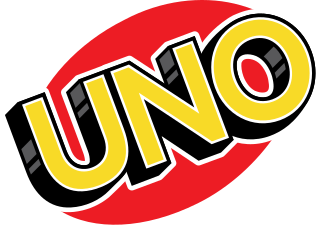
Uno, stylized as UNO, is a proprietary American shedding-type card game originally developed in 1971 by Merle Robbins in Reading, Ohio, a suburb of Cincinnati, that housed International Games Inc., a gaming company acquired by Mattel on January 23, 1992.

Cheat is a card game where the players aim to get rid of all of their cards. It is a game of deception, with cards being played face-down and players being permitted to lie about the cards they have played. A challenge is usually made by players calling out the name of the game, and the loser of a challenge has to pick up every card played so far. Cheat is classed as a party game. As with many card games, cheat has an oral tradition and so people are taught the game under different names.
Spite and malice, also known as cat and mouse, is a relatively modern American card game for two or more players. It is a reworking of the late 19th-century Continental game crapette, also known as Russian bank, and is a form of competitive solitaire, with a number of variations that can be played with two or three regular decks of cards.
Dvorak is a customizable card game that begins with a deck of blank index cards. These index cards are written and drawn upon by players before or during the game. Alternatively, games of Dvorak can be played online via a MUSH or the Thoth card game engine.
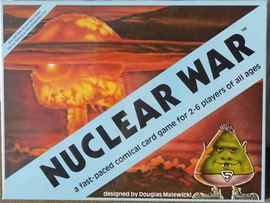
Nuclear War is a collectible common-deck card game designed by Douglas Malewicki and originally published in 1965 that is a satirical simulation of an end-of-the-world scenario fought mostly with nuclear weapons. It is currently published by Flying Buffalo, and has inspired several expansions.
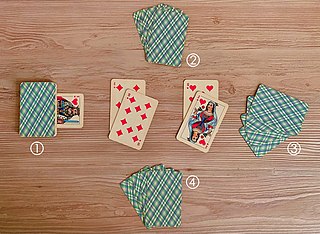
Durak is a traditional Russian card game that is popular in many post-Soviet states. It is Russia's most popular card game, having displaced Preferans. It has since become known in other parts of the world. The objective of the game is to shed all one's cards when there are no more cards left in the deck. At the end of the game, the last player with cards in their hand is the durak or 'fool'.
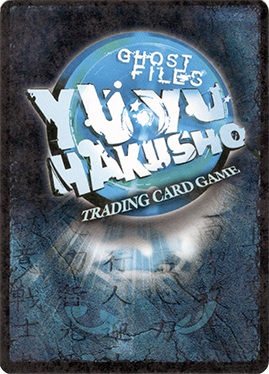
The Yu Yu Hakusho Trading Card Game was first published in 2003 by Score Entertainment, and is based on the anime and manga series YuYu Hakusho. It is a two-player tournament-styled collectible card game; each player uses a deck of forty-four or more cards that is headed by a team of four character cards. The game was discontinued in 2005.

Rummy is a group of games related by the feature of matching cards of the same rank or sequence and same suit. The basic goal in any form of rummy is to build melds which can be either sets or runs and either be first to go out or to amass more points than the opposition.

Monopoly: The Card Game is loosely based on the board game Monopoly. The idea is to draw, trade and organize cards into "color-groups" along with bonus cards. Players take turns drawing and discarding cards until one completes a hand. The value of each player's hand is then counted and they receive the amount of Monopoly money they have earned. The first person to collect $10,000 wins.
Yaniv, also known as Yusuf, Jhyap, Jafar, aa’niv, Minca or Dave, is a card game popular in Israel. It is a draw and discard game in which players discard before drawing a new card and attempt to have the lowest value of cards in hand. The game is considered a backpackers game in Israel, and it's popular among soldiers and young adults returning from long backpacking trips.

Switch is a shedding-type card game for two or more players that is popular in the United Kingdom, Ireland and as alternative incarnations in other regions. The sole aim of Switch is to discard all of the cards in one's hand; the first player to play their final card, and ergo have no cards left, wins the game. Switch is very similar to the games Crazy Eights, UNO, Flaps, Mau Mau or Whot! belonging to the Shedding family of card games.
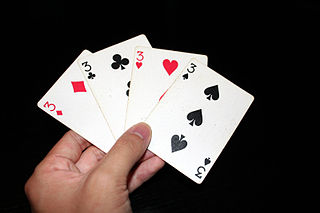
Contract rummy is a Rummy card game, based on gin rummy played by 3 to 8 players. It appeared in the United States during the Second World War. The game is also known as Combination rummy, Deuces Wild Rummy and Joker rummy, and a proprietary version of the game called Phase 10 was published in 1982.
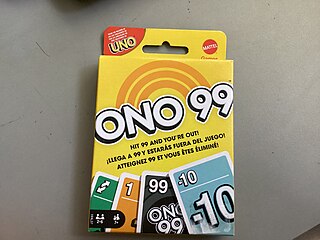
ONO 99 is a proprietary card game produced by Mattel and based on the public-domain card game 99, but played with a unique deck of 54 cards. The object of the game is to play as many number cards as possible while keeping the total value of discarded cards below 99. Similar to the game UNO, ONO 99 has special cards such as Reverse, Hold, and Double Play cards that can alter gameplay.

Four color cards is a game of the rummy family of card games, with a relatively long history in southern China. In Vietnam the equivalent game is known as tứ sắc.
Uno Spin is a variation of the popular Mattel card game Uno, with a wheel containing numerous game alterations. Unlike in Uno, 20 "spin" cards can be played to make other players spin the wheel. The game marketing uses the slogan "The next revolution of the classic card game." The game was designed by Janice Ritter and released in 2005. Gameloft made a video game adaptation in 2010.
Indian Cherokee Rummy is a card game in India with little variation from original Rummy. It may be considered a cross between Rummy 500 and Gin Rummy. Indian Rummy is a variant of the Rummy game popular in India that involves making valid sets out of 13 cards that are distributed among every player on the table. Each player is dealt 13 cards initially; if the number of players is 2, then a 52 cards deck is chosen for the game and if there are 6 players, two decks of 52 cards each is combined for the game. Each player has to draw and discard cards by turns till one player melds their cards with valid sets that meet the Rummy validation rules. It could be that Indian Rummy evolved from a version of Rummy in South Asia, Celebes Rummy, also called Rhuk.
Buraco is a Rummy-type card game in the Canasta family for four players in fixed partnerships in which the aim is to lay down combinations in groups of cards of equal rank and suit sequences, there being a bonus for combinations of seven cards or more. Buraco is a variation of Canasta which allows both standard melds as well as sequences. It originated from Uruguay and Argentina in the mid-1940s, with apparent characteristics of simplicity and implications that are often unforeseeable and absolutely involving. Its name derives from the Portuguese word "buraco" which means “hole”, applied to the minus score of any of the two partnerships. The game is also popular in the Arab world, specifically in the Persian Gulf; where it is known as 'Baraziliya' (Brazilian). Another popular variation of Buraco is Italian.

Shadow Hunters is a social deduction board game designed by Yasutaka Ikeda that was first published in 2005 by Game Republic in Japan. The game was published in the United States by Z-Man Games in 2008. The art style of the game closely resembles the style found in Japanese anime and manga.
Cuttle is a two player card game played with a standard deck of 52 playing cards and is the earliest example of a combat card game. The game's earliest confirmed appearance took place in the 1970s, though the exact date of its creation is unknown.